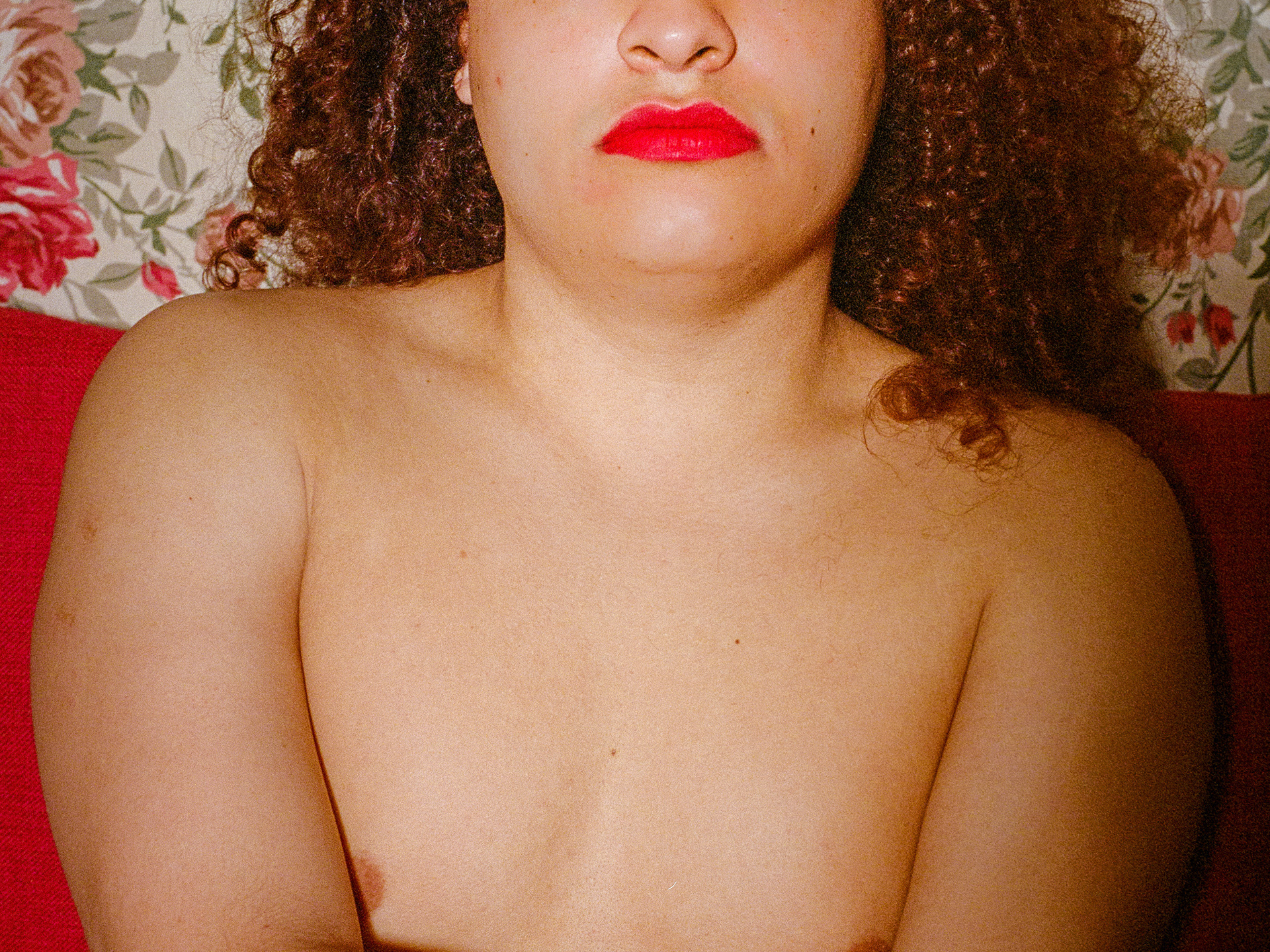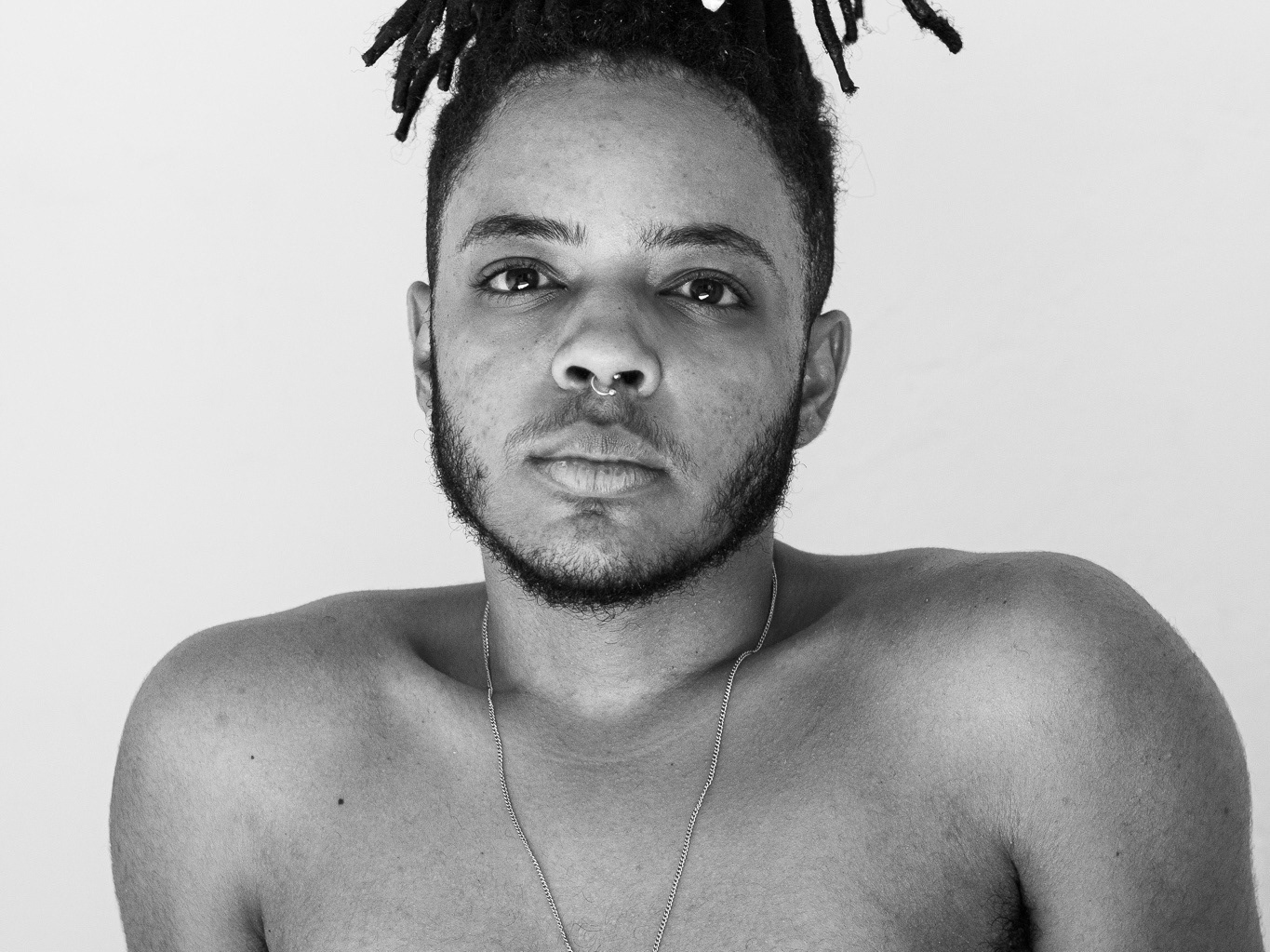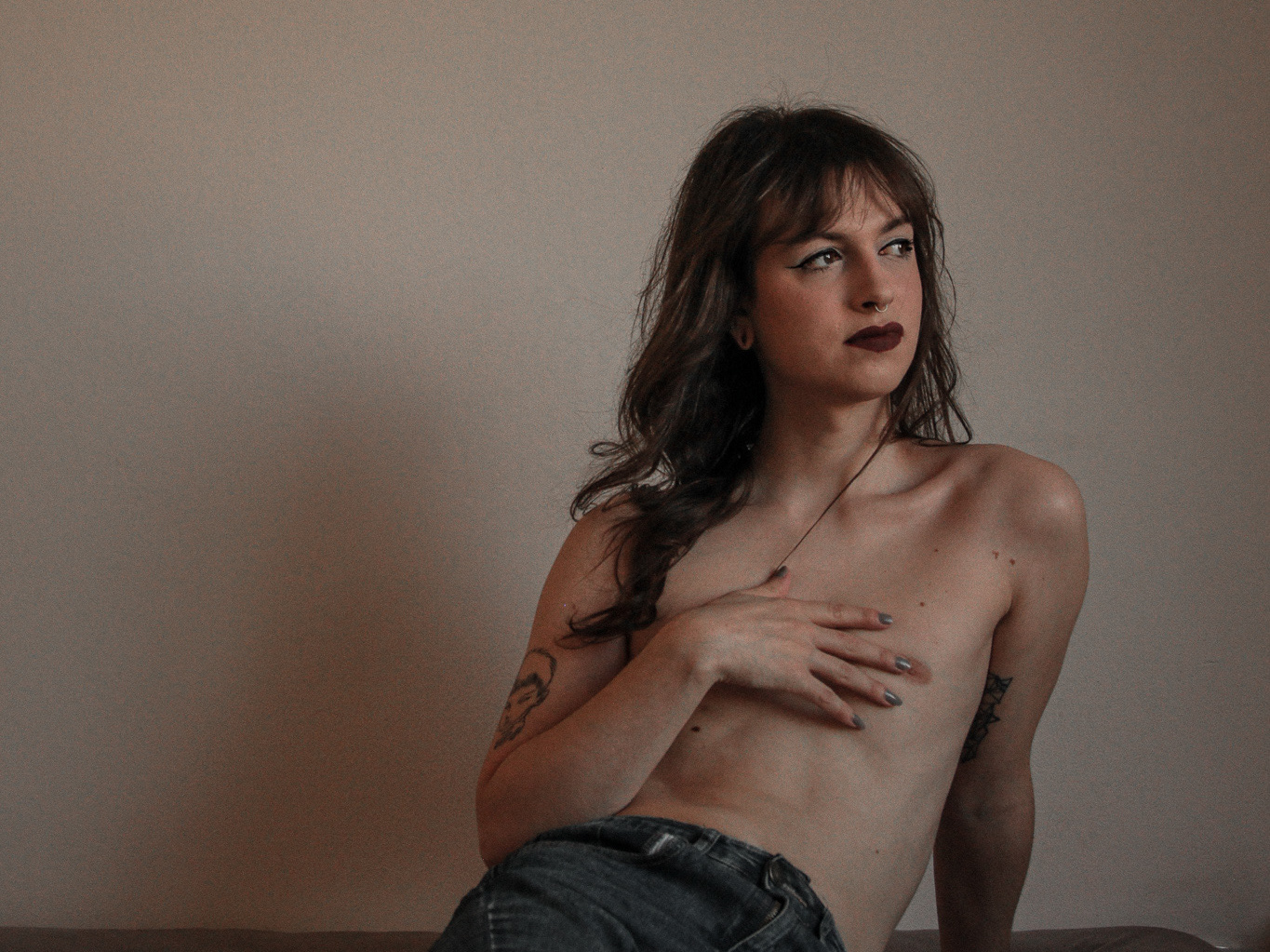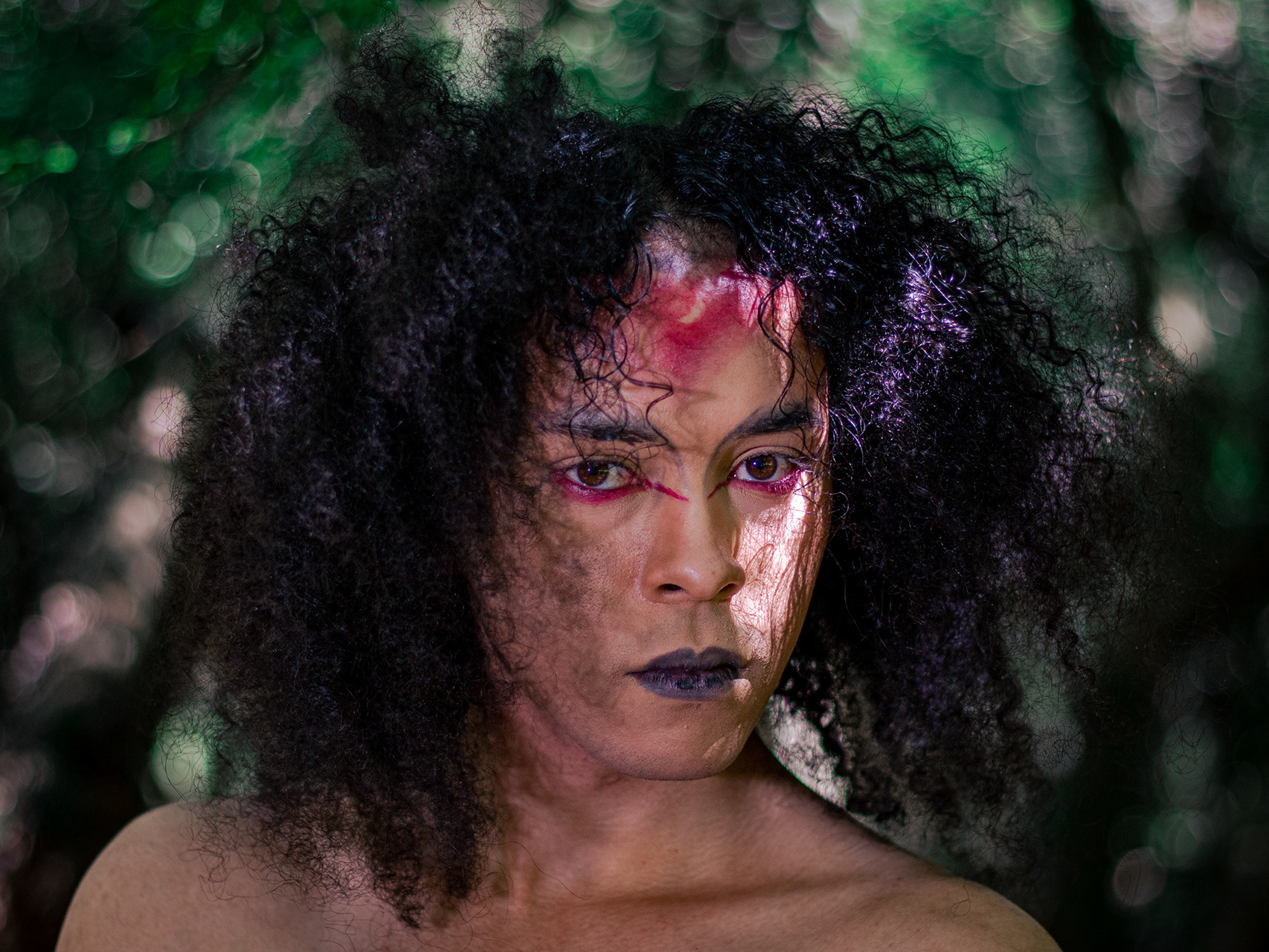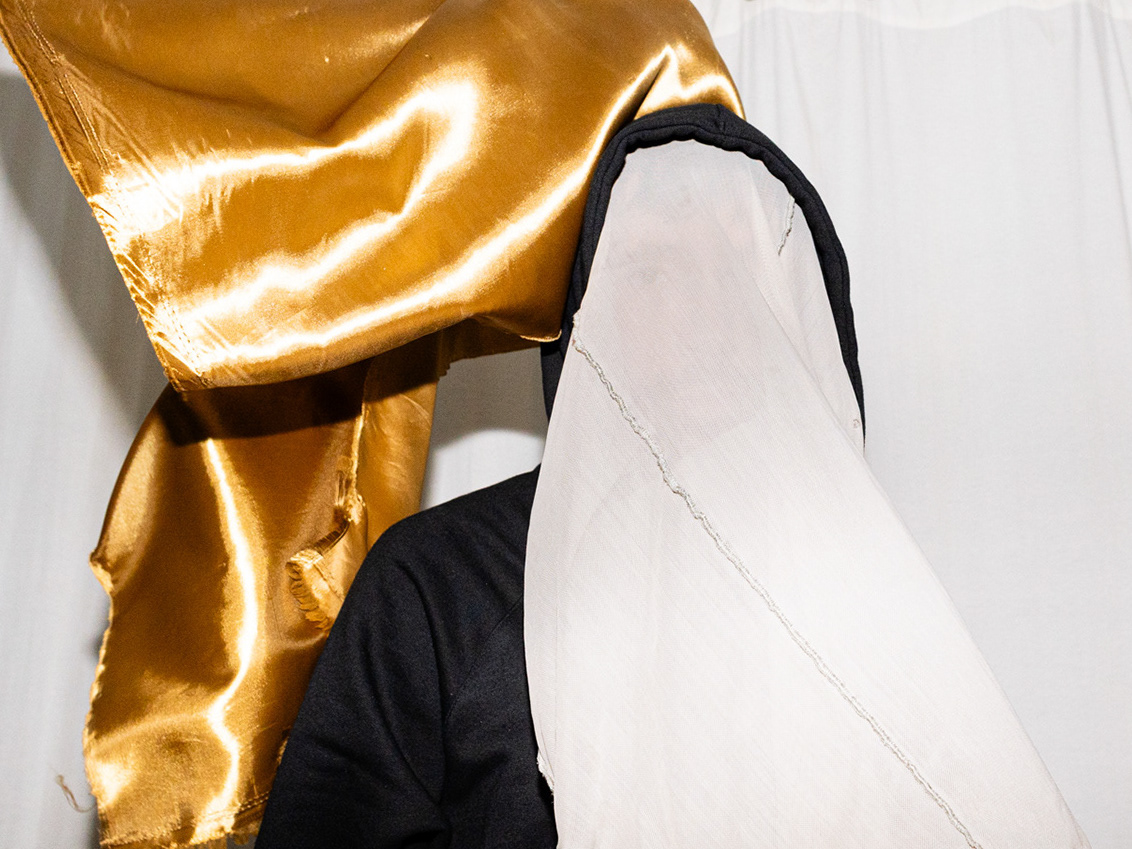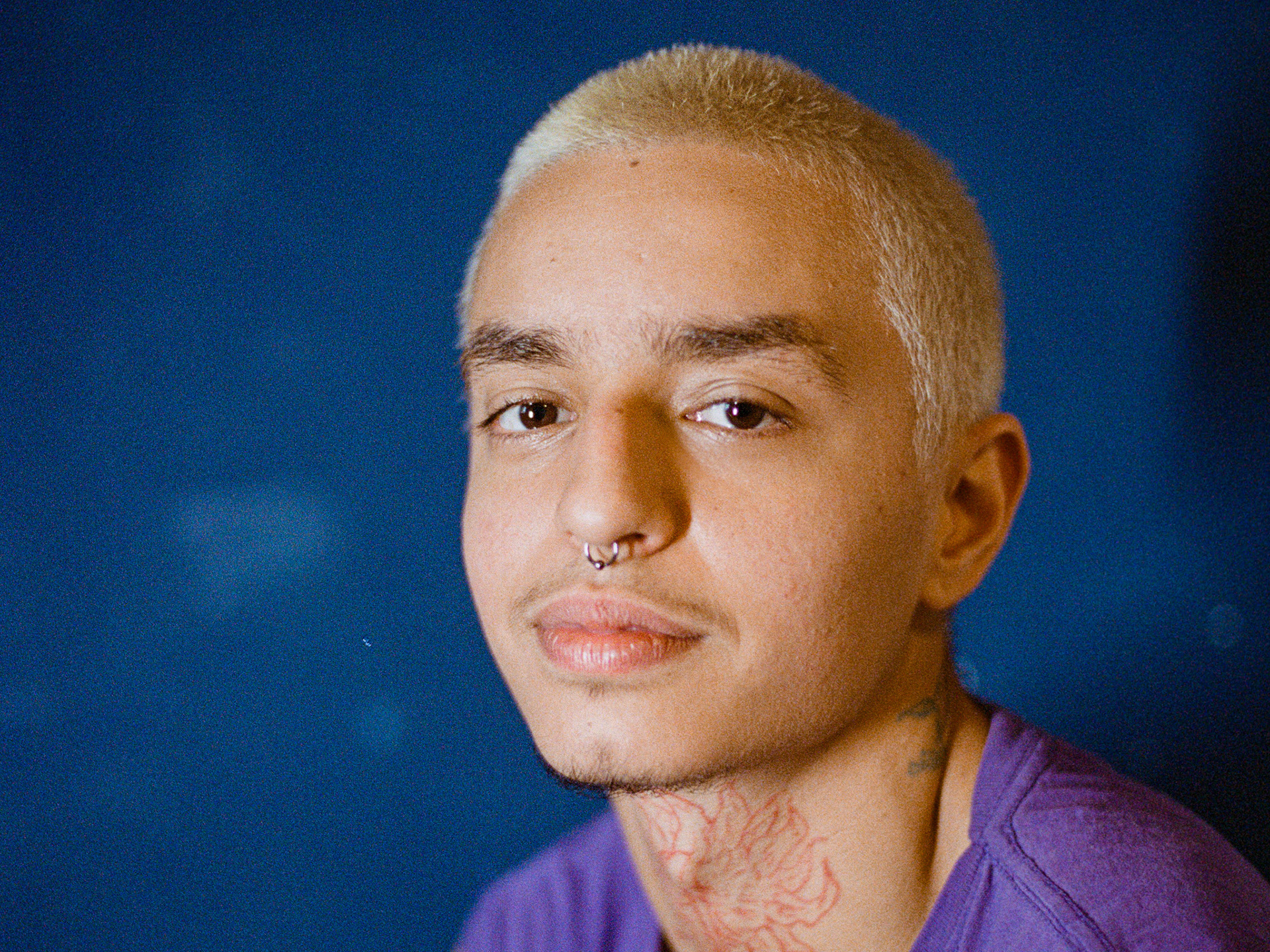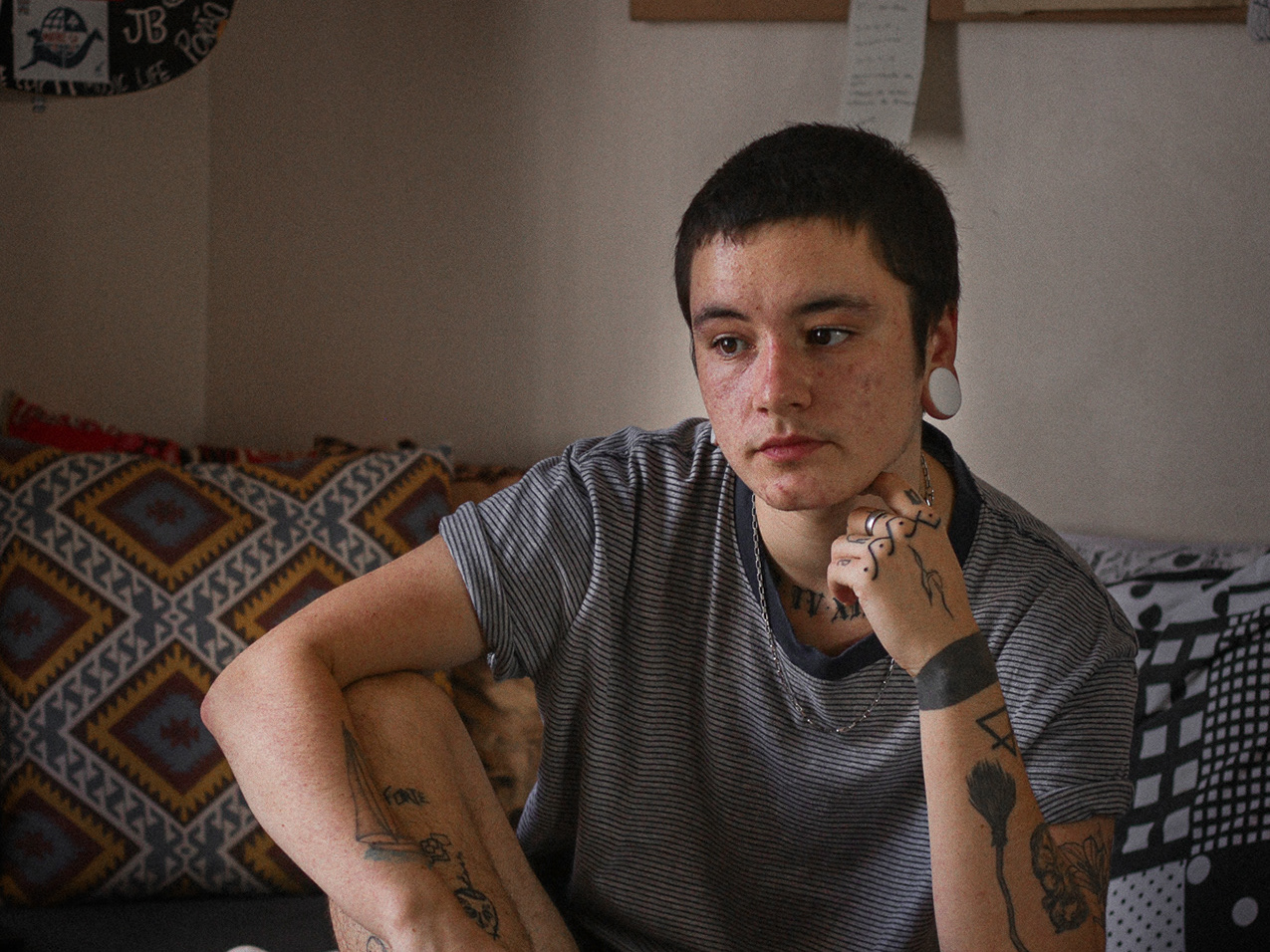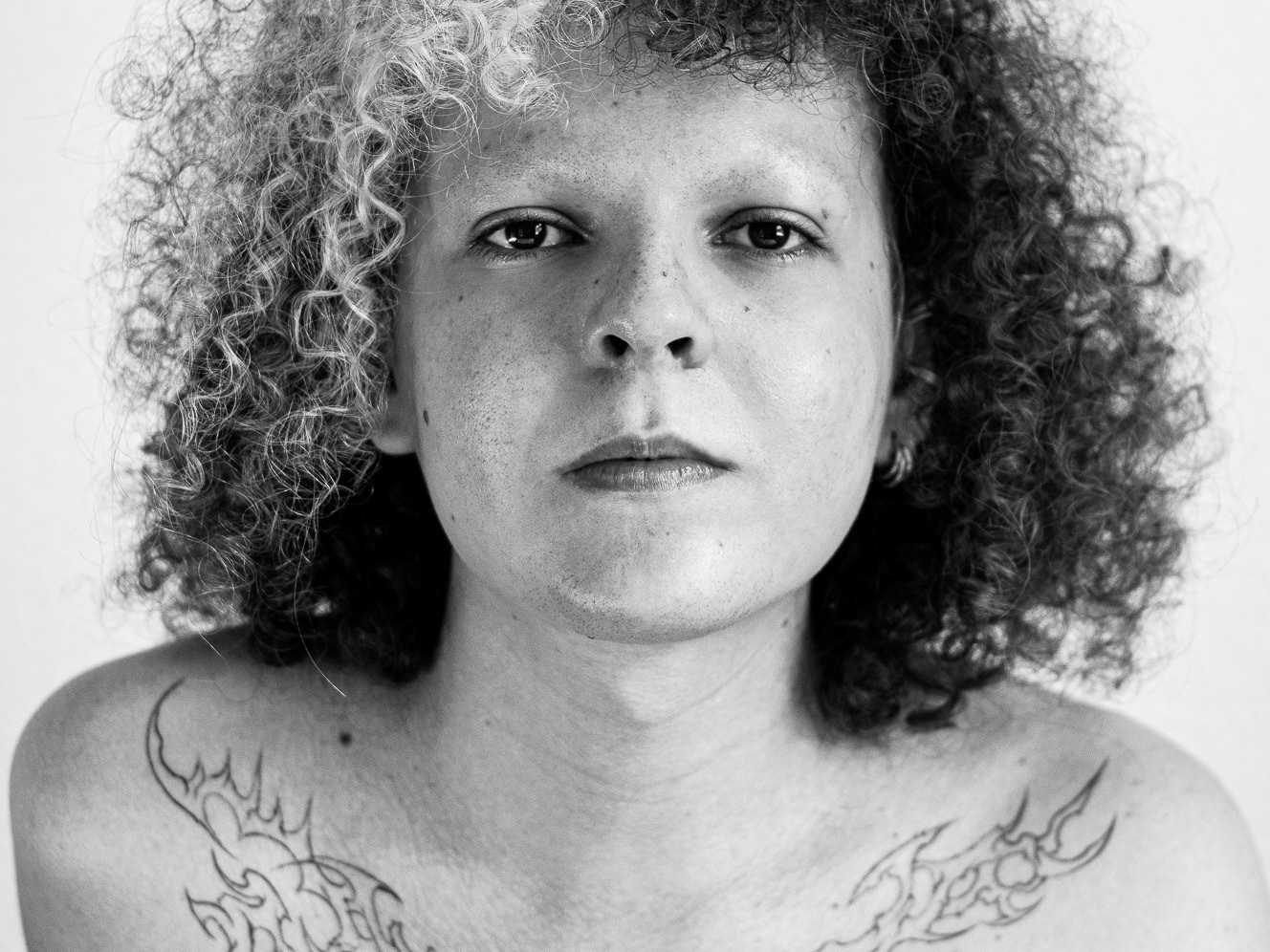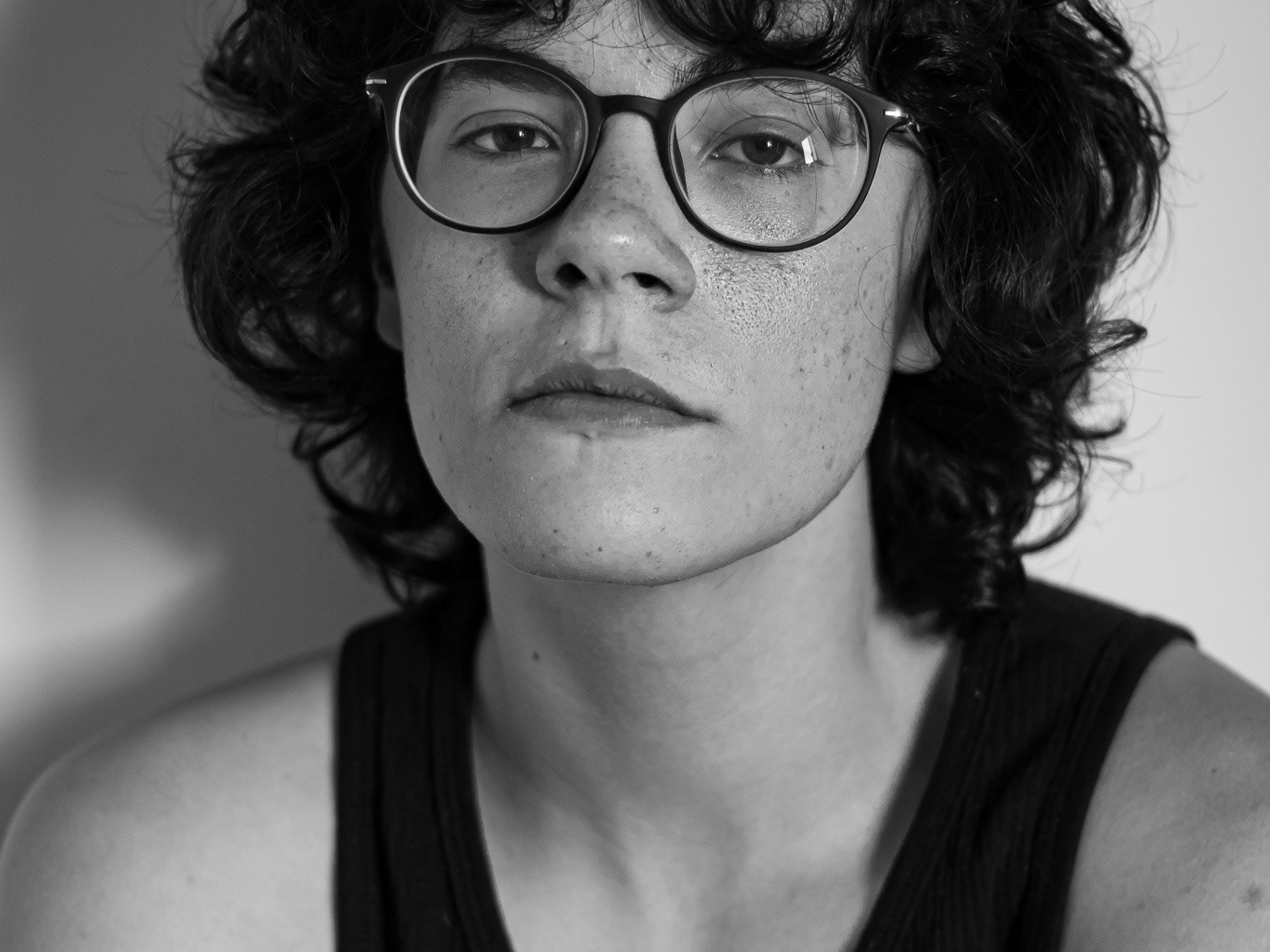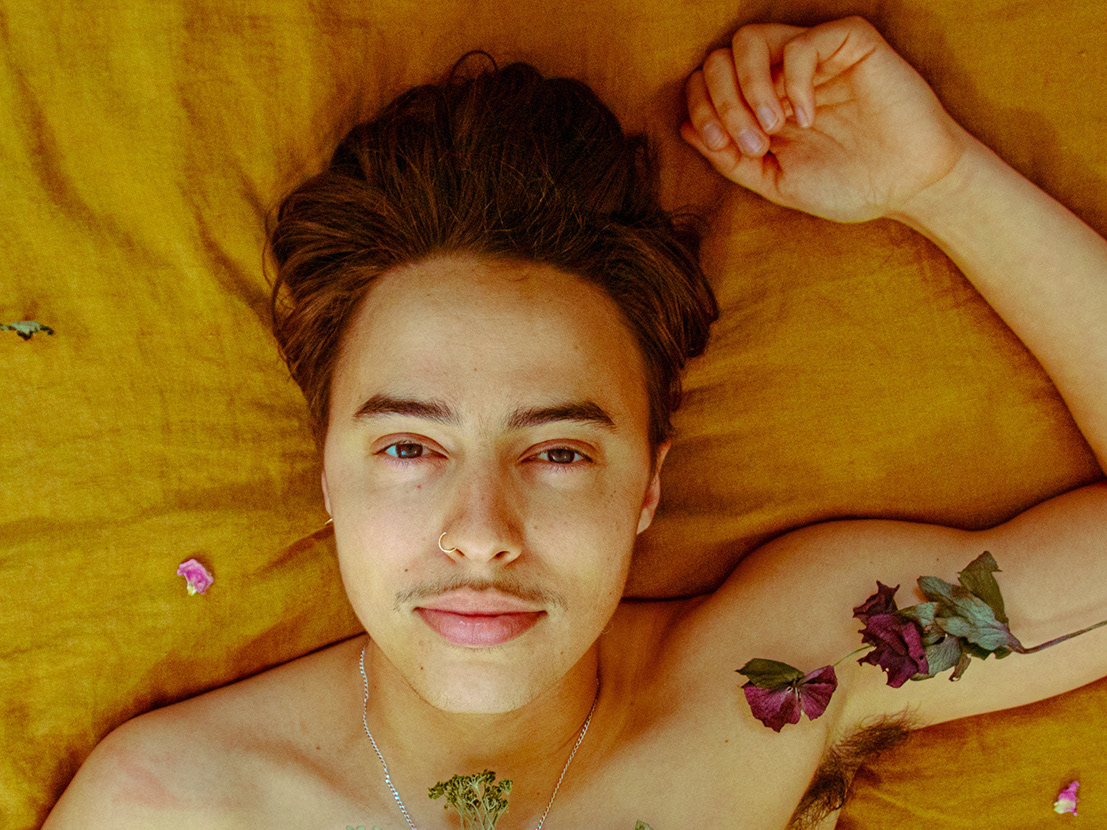[ *trigger warning: child sexual harassment, eating disorder ]
It was very explicit in my childhood that I was a little travesti kid, but due to family, school, pressure from society, my mother believed she was raising me wrongly and started to change course, like "you can't play with your sister anymore", "you can't use that kind of clothes". I think by the age of eight or nine I had already understood that who I was, who I wanted to be, was wrong. I remember going to a psychologist and being asked "what do you want to play with?" - there were dolls and toy cars, and I remember thinking "I know I'm here because I like to play with dolls and I'm always beaten when I play with dolls, so I'll get the toy car to prove to you that I don't have any problems." Sometimes I think that wow, I was a six or seven years old child and was doing this reasoning... So it bothers me a lot when people think that I transitioned only later, in adulthood, that there wasn't a whole trajectory of a life, that if there was a transition, it was an imposition for me to live a compulsory, unhealthy cisgender-ness. I have trouble seeing photos from this specific period because I look at it and like, wow, I did live a lot of good stuff, but I didn't know how to express happiness, I didn't know how to put myself in the world because I simply didn't know how to be, I didn't know. It was very crucial when I looked at everything and said "you know what? come here because I need you, little travesti child who stayed behind!" (laughs). I am experiencing my full and happy self and rediscovering myself. I joke sometimes that at these stages I think I'm still experiencing my trans adolescence, I'm not a trans adult yet! (laughs).
I was talking with a friend about this thing of "oh, let me see what are the makeups in this store, I need to take this one" - I don't, I probably won't use it, but, you know, it's something like "I never could have this and now I can, it is me who is making this decision". Some silliness, but it's fun, right? Things that at some point in my life I couldn't experience. I was talking to some friends - they are cis women who are more involved with the feminist movement and have some works that try to deconstruct this logic and imposition of what it is to be a woman and what is feminine and what it's not - and then I was talking to them and I said "I'd love to be part of this process, but I feel like I'm in a moment where sometimes I really want the stereotype." It's what sometimes wasn't allowed to me, and I know I won't be in this space forever, in a little while I'll forget about it, but it's this moment, like, if I'm going to put on makeup I don't want a distinct makeup, I want a basic makeup so I can look at it and say "oh I look cute", you know? I thought "I'm so lazy, I didn't get ready to receive you", for sure tomorrow I'll say "oh, why didn't I wake up early one day?". I bought those blindfolds to sleep, inside came a piece of gel that you can put in the fridge, then I put it in the fridge because I was going to wake up early and I was going to put it on to deflate my eyes; there is this side of me that seeks a feminine ideal that is non-existent and at the same time I am a lazy person so I am between these two universes. (laughs) I do what makes me feel good, putting on makeup is a hassle, but I choose to put on makeup when I have time and I feel like that moment is the moment I'm enjoying myself, it's something for me. Of course I take about 300 selfies later to record that moment when I was feeling good - but I still have a problem, like if you go to my Instagram account you won't see any photos without makeup. I still have difficulty connecting that what you are seeing today is also me, this is also trans, this is also a travesti, this is also femininity. I have yet to learn to see myself strong in this place too.
It was a very happy childhood, I was a very happy child but I knew I had to do the trick all the time. Only later, in adulthood, I understood that this was unhealthy. I think it was when I was about 24 or 25 years old that I, by myself, started to study and research these things, to try to bring some elements of this to dramaturgy. At that time I was already working with theatre, I taught classes, I liked and I still like to write. There was a moment when I realized that it was absurd that with the space I had, being able to produce and create stories, I often created stories that I didn't see myself there, a play with 15 actors and actresses and there wasn't a... And I was the one organizing it.
At some point I realized that my work with art was much braver than me as a person, that I spoke what I wanted to say, I lived what I wanted to live. And then, I think it was in 2013, at the beginning of dance school, that I said "okay! Now I want to reverberate from there, so I don't care if I don't say everything I want to say in my artwork, I'll say what I can say today". This "clean face'' thing, from the performative action, the choreography, the presentation, in short, I wanted to see myself as powerful as who I was in the scene. Then I started to socially experience my gender identity, which before, for a long period, lived hidden, at night, only in hidden relationships... There was that moment around midnight where "ok, now I can be who I am, go out with the person I'm liking." Everything in the underworld itself - I wouldn't say underworld because there's a lot of power in it too, and I'm glad I had this space - let's call it twilight, not underworld, twilight. I was reading a text the other day and the author talked about how people often want to shed light on our trans experiences to show the importance of our existence in general, but in true, people should cast shadows on our existences to allow our own light to shine; I found it so poetic, so beautiful, so true. And I realized that at that moment it was a lot of that too: I could have been living in the twilight but it was something I had to experience to find my light and my way to shine in the world.
I also remember of a time when I saw people talking a lot about the loneliness of trans people in regards to affective relationships and such and that froze me, because I was at that stage in the early twenties when we still think a lot about what the other is thinking about us and I remember that I had these thoughts like "I don't know if I could live alone, without affection, without having..." At some point this changes so drastically that... Without my self-love there will never be a real, true exchange with another person and, gee, I've been single for a long time and I don't feel it - I think it's also because I am still a teenager, I can't date. (laughs) But it's about experiencing my transgenderedness, it has absolutely nothing to do with the other person, it's mine, it's for me, it's very... I was going to say it's very selfish, but I don't know if selfish is the word, but it's something for me - maybe later on I will, but today I don't miss a physical or emotional relationship, even because we're living in a pandemic, so I don't even know what it would be like. It's like "ok, I've taken a shower that has cleaned me up in such a way that from now on only whoever I really want to will only touch me, you know?"
That was another crazy thing. What I was talking about... I only have this notion today, but in my childhood everything that I wanted to be and people said it was wrong, it was put under the perspective of being gay. And you hear this many times, many times, many times. I think I never got to say "I'm gay", there were a lot of people who said that to me and there comes a time when you say "ok, I think I am. I am and I can't not be", because people say you are and you cannot be. So especially in my teens, early adulthood, I thought that was one of my life issues, living in this world as a gay boy. That's why I talk about the importance of experiencing periods in the twilight. I remember once... one of the first times I went out with a guy I was flirting with he said "do you like to wear feminine things?" and immediately I told him "no! Of course not!" then he replied "I think it would look good on you" and that broke me because I spent my whole life hearing "no, you can't, that's wrong".
It's good that I had these moments of twilight because they provided me with affections that I would never have in other places. Still in my early adolescence, again, the things considered feminine, which shouldn't belong to my body, whether by behavior, attitudes, but also, in my body there were things that denounced this before I manifested myself, which were a voice, at that time, extremely feminine. People confunded me with my mother on the phone. My two years older brother and cousins of the same age had already changed their voice tone and I still had the same voice, which was a beautiful voice - I wanted to know what it would be like to have that voice today. And when I gained two or three kilos, where did my body change? In the chest. So I was always hiding, always trying to lose as much weight as possible to... Because it was another thing that gave me away, like "look, breasts". At school they made fun, tried to pull a non-existent bra. One day I had allergies, like little water balls in my hand, and in the blood tests I did, in addition to finding out what was causing the allergies, it pointed out that for the age I had I should have already stopped producing so much female hormones and started producing more male hormones and that wasn't happening yet, I was producing both more or less in the same amount. And that was why I hadn't changed my voice, why my body wasn't meeting the demands of an ideal male body. And without anyone asking me, without even understanding what was going on, I was subjected to a testosterone treatment between ages of 12 to 15. That's when my voice started to change. I was told that I had a problem and that this would fix the problem, okay, subject closed.
One of the medicines I had to take was made with ox testicles and it horribly tasted like rotten blood! It was horrible to take that, I had to take it every day. At that time I was going to a doctor in Ana Rech - a more remote neighborhood, it's still part of Caxias but it's almost another city - and they said he was kind of spiritual, in addition to being a doctor. This doctor, wow! I was really scared to go see him mainly because he was a gay man, and how did he attend to men? The women had to leave the room, the men stayed and then he knew what the men needed by feeling their balls and penises, that was how it was. And my father - let me see if there are any pictures of him here... No, good! - allowed this man to do that to him, to me and to my older brother. It was horrible, horrible. The first time he attended me he said, I remember so well, that man crouched in front of me, picking up and saying "you see? Today your penis is this small, but from now on you will take some medicine and it will grow and you will be much happier!" Oh, the level of disgust that I started to have for my own body from that moment on, for the man, for having someone touching me, and with the consent of adults, oh! That was, like, so traumatic. There were times when I had to go there only with my father - I didn't even have my brother with me, because my brother was fine - to see the progress of the treatment, and how did he see the progress of the treatment? Seeing my genitals. There is another layer of violence, of touching, oh... It was horrible. I think to this day I can't measure how bad it affected me, including allowing other people to touch me. And one of the medicines I had to take, the one that tasted like rotten blood, was this man who prescribed it.
Then when my voice changed, in the meantime, I unconsciously started to develop an eating disorder so my body wouldn't show any curves. So, there was this, I took hormones that thickened my voice and I stopped eating to dry my body, then, "okay, everything's solved. There's no problem with this child anymore, let's look at the other one."
I looked at this again about three years ago when I went to do some blood tests and it showed the same changes. I wasn't taking any kind of medication, hormones, or anything, and this change was again accused - always being put like this "it's a change, your body shouldn't be like this, we have to correct it". But at this point in my life I had already studied about gender and sexuality, I had already studied about intersex bodies, and sometimes I even thought "hmm, this story is very similar to things I've experienced, but no, no. It has nothing to do. It's too much to think that I have everything..." And then I talked a lot with the doctor, I even had to bring a lot of information to him, and then I had the confirmation…
But at that moment I identified myself as a trans person, so I had that moment of being in a body denounced as gay, until I understood myself as a trans person and then I discovered myself as intersex too. I think that in a few years I'll discover that... I'm kidding! I don't want to find out anything else (laughs). For one life, this whole trip is already more than good. But I think what I said was this, how it is also interesting and beautiful to get to know yourself, to allow yourself to change and accept different and new things. It's obvious that there were some periods where I certainly lived like "no, of course not! I can't be a trans person. What is a trans person? A trans person is a person who is prostituting herself on the street, is the one that everyone makes fun of, and who appears on TV to be ridiculed... No, there's no way that I am that, but, my goodness, deep down inside I think that's what I am." And then to understand that "I am this", it is not that stereotype that is being imposed, I am my version of this experience, but until understanding this there is a period of denial, fear.
I can't say exactly what, but there was always something that made me think "I have to let my sexism aside, I have to deconstruct it", because I always loved seeing femininity in trans people and found this brave. In the beginning, when I was starting to socially experience my transgenderness, I saw myself in a photo or even in the mirror and the first reaction was always "oh! no, I can't, no! There was still that impulse from my childhood like "no, you can't. go play with a toy car". I have the feeling that "deconstruct" became a banal word, because I didn't want to deconstruct myself, it was something necessary for me to live, for me to continue... For me to be happy. I associate these changes a lot with "I'm supposed to be happy, I'm supposed to get back to feeling pleasure in life, to having achievements and knowing how to celebrate." You know? Of being happy in celebrating my birthday, of wanting to celebrate my birthday because for a long time I thought "birthday? what? No, let's not talk about it, I don't want to do anything." Then my mother would do something to celebrate and my answer was "I asked you not to do it, I said I didn't want anything." Because it was a body I didn't... What did I want to celebrate in that body? In that life?
I'm glad that I had a family structure, and ,observing these intersections, the privilege of being a white person, of not having been exposed to other types of violence, and not having other types of access denied, other experiences, uh... I'm glad that I had some structure to be able to understand this and be fine today. Even the fact of, like, when I realized that I needed psychological and psychiatric help, that weren't necessarily related to these experiences, but for general things in life, work issues, relationships with family members, these issues that end up mixing with everything. Just the fact of asking for help and having access to it, I see a lot of stories of other trans people where this... I wouldn't say, I don't know if it's a privilege... It's a privilege in relation to other experiences but I'm just having opportunities that should be normal; not that they are privileges in relation to everyone, like "wow, look...", no. These are in fact basic things and unfortunately most trans people still don't have them.
I didn't expect and it never crossed my mind that I could help other people, because from the moment I started introducing myself as Márcie... I noticed the importance of introducing myself as "I'm a travesti", it creates a huge noise in some places - I don't do it on purpose, to provoke. It's about different stories, noting that a travesti can also be presenting an oral communication at an academic congress. Then, all of a sudden, people start writing to me, people here from Caxias, from the region, sometimes people I didn't even know, like "so-and-so told me to talk to you because I think I'm a trans person, but I don't know what to do". And being able to say "look, you can look for help, there's this NGO..." - I keep pointing out the works of the NGO Construindo Igualdade -, "Look, while they are not offering services, watch this video, watch this documentary", "how are you?" Then, suddenly, the person comes back "look! my new certificate". This also comes up, which is something that is very subtle and exists in our community, like, we know that we have to take care of ourselves, because otherwise we... Not everyone has other people to take care of them. Thank God I had my mother, because many times I had to ask her "oh, hold me because I need it", and many people don't have someone, so I realize that in our trans community there is affection and a desire to see that the other shines too, that the other succeeds, that the other... How good it feels to reference trans people in academic work, to write an entire article only using trans references without the need to mention it, but it's there. Maybe the work isn't even about trans living, sometimes it's about education, about art, anyway, but how important it is, at the same time it's subtle it's also gigantic.
I came to understand the importance of mentioning being intersex - and I'm still learning, because there are things I'm not sure how to put, for example, in addition to presenting myself as travesti, is it important to also present myself as an intersex body? But at the same time there are so many subjectivities related to being intersex, things from my particular experience that perhaps I still have to study more and be a little more aware of the importance of it so to talk assertively in relation to being intersex. Because from what I observe, the greatest importance of talking about it is to prevent absurdly violent experiences - like the one I experienced with that doctor - from not occurring with other people, because it is something that medicine still controls a lot, we still live under stigmas. And it's not something very talked about, many people don't even know what the "I" of the LGBTI acronym is. It's spoken, it's written, it's placed there, but what exactly it is.
Sometimes in forms they want to trace the target audience and they don't put intersex together with gender identities. And sometimes you can only choose one of these experiences and I'm like "okay, should I say I'm a trans woman, a travesti or intersex?" But intersexuality has nothing to do with my gender identity. There are many intersex people who identify as cisgender, who identify as heterosexual, who live a completely normative life and, due to the way they were conduced in childhood by doctors, do not admit or talk about it, they do not accept or say that they are an intersex person, they prefer to use the medical term. For example, it's like I didn't accept saying I'm intersex but I understand I have Klinefelter Syndrome. "I have a syndrome, but I'm not what they're saying I am". Mainly because of the absurdity of mutilating genital surgeries, the amount of stories I've heard like people saying that doctors say "it's easier to dig a hole than build a pole" - I heard this so many times I even think they learn this somewhere.
So, if the baby was born with an ambiguous genitalia and they can't live with that, it's nothing more than a cosmetic surgery to ensure that that experience is of a cisgender body - except for cases of, like, it won't affect anything in the urinary system. So it's easier to turn that into a vagina than a penis. There is a very potent documentary, a short film by Amiel Vieira, an intersex man. As a child he had undergone these mutilating surgeries, but no one in the family ever told him, he didn't know he had experienced it, he had no idea of anything. And then, as an adult, he was going through some documents and found some papers from the time he had surgery as a baby, so he asked his mother. She did not understand what it was because the doctors said it was necessary and did the surgery. Then in adulthood he will understood that besides being intersex, in his case he wasn't "she", but "he". So, often, the person's own story and their right to have access to their story are being denied. Like, if I hadn't studied a lot... In my case, one thing that was deprived of me that I can put into concrete terms is the question of my voice, which in fact I wouldn't say I like. But it's who I am too. Why do I have to have the finest, most feminine voice, you know? I don't. But there are times when I would also like to have... Somewhere in my body, maybe that was my voice, and I didn't have the right to keep having that voice. But in my case it's just my voice, in the case of other people it's the physical body, it's the right to look in the mirror and say "I don't know what they did to my body, I don't know how my body once was". At some level, non-binarity - as a matter of gender identity - will approach intersexuality by breaking with binary norms. It's wrong that in fifth grade, in science classes, we still teach children that there is a male body and a female body, period. Since there is a huge variation between one and the other. To continue teaching this at school is to continue perpetuating that this variety that exists in human biology itself is not correct, it needs to be fixed. And no, it doesn't need to be fixed, it's not wrong, no one needs to change their body. Diversity exists even in nature.
We are all biological. People say "oh but you're not a biological woman". There's this subtlety, which sometimes worries me, that some intersex people say "oh, but I was born this way, my biological body is like this", but before I knew I was intersex my body was still biological, I was born this way too. There is still part of the community where people want to put one experience as being more valid than the other - what we were joking before about suffering, "how much did you suffer? I suffered more than you, so I'm more trans, I'm more intersex than you". What opened my eyes to these things was approaching ABRAI (Brazilian Intersex Association), when I understood that "ok, I'm intersex", the first thing I felt was the need to hear people talking about it, I wanted to read about it. I don't just want to read like "it's written in the caption: intersex", no, I just want to read this, I want to understand about it. That's when I met ABRAI through Carolina Iara, today she is co-councilor in São Paulo, she presents herself as a black woman, travesti, intersex, HIV positive; the first time I heard her talking, mainly about her experience as intersex, I was like "I need to walk with you in the playgroung! There's a lot I need to know!" Then I got in touch with her, I was embarrassed to say "I'm intersex too, help me", I just said "I thought what you said was very important, I wanted to know more about it, where can I do this?" She is part of ABRAI and referred me there, then I started to understand that, my god, there is a lot of history, a lot of experiences, you know, there's a large variation even in what can be classified as an intersex body - I have chromosomal and hormonal variations, I have XXY chromosomes, which creates this hormonal change, I'm sterile, I couldn't have biological children.
I'm not sure but I think it comes down to having trans and travesti affections, living with trans, travesti and intersex people. First, we are already breaking with the stereotyped notion of these experiences - I can share affections of friendship and trust, I can live together and learn with these people and their experiences. And if for some reason you're wondering whether you're part of that or not, it'll be much simpler, because you already admire and have contact with these people you already… Somehow that is already part of your routine, of your life; even if it's from the experience of the other. I think for some people it's still a big challenge because we aren't taught to admire trans, travesti and intersex people; they don't teach us to consume intellectual, artistic productions, anything that comes... And if we do consume it, we can't talk, we have to hide it.
Sometimes there are people who write to me "oh, I'm in college and doing research about trans lives and would like to know if you're willing to participate in my research", I always ask "are you trans too?", then "no, no! I'm researching because I think this is important", then I "oh, and have you interviewed your friends, your transgender friends?", "no, it's just that I don't know anyone", "so if you don't know anyone, if you're not close to these experiences, these bodies, why do you want to research this? If you think it's important, why don't you have trans friends? Why don't you spend time with trans, travesti, intersex people?" Because we are still living in this weird territory of people who see us as an object of research, as... There's a small space in academia where researching about this it's kind of a trend; "I do research about it, but I only do it because..." I don't know, it's a gap that you found and that you're trying to fill because you don't... Kindly, in some cases, I've already said "I'm sorry, I'll refer you to someone else" (laughs) I've already given these problems to other people to solve, like "I don't even want to say this is kind of questionable". I don't have much patience sometimes, because I could also say "ok, I 'll do it...", and then in the survey say "see? There's something very strange that could be better", but we're not always willing - that's tiring too. I like education, I'm a pedagogue, I'm interested in gender studies, I believe in education as a gigantic tool for human transformation in general but also to somehow try to echo these absurd differences that still exists, the lack of information, the lack of knowledge; but I'm not always in the mood to teach all the time.
I realized this even more when Cléo [Araújo] invited me to coordinate the NGO's PreparaEnem [prep school for the Brazilian National Exam] and I felt "my god, what a responsibility!" And we needed volunteer teachers for all subjects and there were some that it was difficult to get teachers, so we had to publicize, make a call to those who were interested. And there were a lot of people, who certainly felt great because they said "oh... I volunteered", but when I went to talk to them, the person had no time, there was no way to commit to that.
•
•
•
Márcie Vieira
1984
Artist and educator. 37 years. Sookie's Human. Gladis' daughter.
"I took the photos 2 days after removing an inflamed wisdom tooth. I literally woke up still swollen and went to take the pictures. I tried to feel vulnerable in the process, but the exercise of seeing myself not doing cute selfie poses demonstrates how much I still have to know myself."
1984
Artist and educator. 37 years. Sookie's Human. Gladis' daughter.
"I took the photos 2 days after removing an inflamed wisdom tooth. I literally woke up still swollen and went to take the pictures. I tried to feel vulnerable in the process, but the exercise of seeing myself not doing cute selfie poses demonstrates how much I still have to know myself."
*essay from August 2021, Caxias do Sul (RS), Brazil
Project financed by the notice resulting from the Term of Consensual Commitment signed by PRDC-RS/MPF as a result of the early closing of the exhibition "Queermuseu - Cartografias da Diferença na Arte Brasileira"
-
This project was idealized and is made by Gabz, a transmasculine non-binary multiple-language artist. Ser Trans is a project that portrays and also makes room for trans, travestis and non-binary people to be the protagonists of their own histories. We look for representation in front and behind the camera. This project started out of urgency. Ser Trans is made also by the collaborator Lau Graef, transmasculine artist, visual arts student and autonomous activist; and Luka Machado, travesti, actress, visual artist and activist.
Ser Trans is autonomously produced by trans people and all content is offered for free. You can sustain this project by sharing it with friends and making a one time or recurrent donation - any value is welcome. For early exclusive access to all content, subscribe to the project's Patreon. To know click the link bellow. Thank you for supporting a project made by trans people <3
Self portrait of Gabz developed by Eloá Souto and scanned by Lab:Lab
